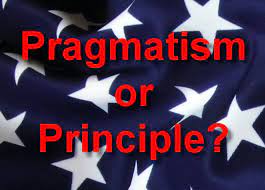CHITRAL: In Pakistan, politics has been an unprincipled game play, ever since it evolved after partition. In Chitral when someone chides and wants to tell the other person not to fool him, he says “don’t play politics with me”. Pakistani politicians call defiling of principles as ‘pragmatism’ and this has been the way of most politicians for most part of our history. Exceptions have always been there to quote today, like the late Khan Abdul Wali Khan who firmly stood by his principles in politics, or the late Ataliq Jafar Ali Shah MNA from Chitral in the 1970s who when he was offered a Minister of State portofolio by the late PM ZA Bhutto for leaving his party (PML Qayum) and joining PPP, politely declined the offer by saying he was elected on the ticket of a particular Party and is morally bound to remain loyal to it.
When Chat GPT was asked for a writeup on the subject, it produced the following:
In the realm of politics, two contrasting approaches often vie for dominance: pragmatism and principled stands. While pragmatism emphasizes flexibility and compromise to achieve practical goals, principled stands advocate for unwavering commitment to values and ethics.
Pragmatism in Politics:
Pragmatism in politics is a philosophy that prioritizes practicality and adaptability over rigid adherence to ideological principles. It often involves compromise and negotiation, with the goal of achieving incremental progress by making concessions. Supporters of pragmatism argue that this approach is necessary for finding common ground among diverse interests, fostering bipartisan cooperation, and advancing public policies. Pragmatic politicians, they argue, can make the best of a challenging and dynamic political landscape by being open to compromise.
Principled Stand in Politics:
Principled stands in politics, on the other hand, are rooted in a steadfast commitment to certain ethical and moral values, regardless of the political context. Politicians who take principled stands refuse to compromise on fundamental issues that align with their core beliefs. These principles serve as a moral compass, guiding their decisions and actions, often at the expense of popularity and political expediency.
The Edge of Principled Stand:
1. Moral Clarity and Trustworthiness: A principled stand in politics conveys moral clarity. When a politician unwaveringly adheres to their principles, it fosters trust among the electorate. Voters can rely on the consistency of a principled politician, knowing that their actions align with their stated values. This trust forms a strong foundation for productive governance.
2. Long-term Impact: While pragmatism may yield short-term gains, principled stands often have a more profound and lasting impact on society. History shows that many transformative political movements, such as the civil rights movement and the abolition of slavery, were driven by principled individuals who refused to compromise on fundamental issues.
3 .Accountability and Transparency: Politicians who take principled stands are more likely to be transparent and accountable for their decisions. Their unwavering commitment to values encourages them to openly explain their actions and justify their positions to the public. This fosters a sense of responsibility in government.
4. Shaping Public Opinion: Principled stands can also shape public opinion and provoke meaningful debate. By challenging the status quo and advocating for moral and ethical values, principled politicians can encourage citizens to reevaluate their beliefs and values, ultimately pushing society towards progress.
5. Inspirational Leadership: Principled leaders often serve as inspirational figures who motivate others to stand up for what they believe in. Their commitment to their principles can inspire a new generation of leaders and activists who work to bring about positive change.
Conclusion:
In the world of politics, the choice between pragmatism and principled stands is often a complex one. While pragmatism can be effective in addressing immediate challenges, principled stands offer a unique edge in the long run. By remaining steadfast in their commitment to core values, politicians can earn the trust of the public, shape public opinion, and inspire positive change. Ultimately, a principled stand in politics is not merely about ideology; it’s about the enduring values and ethics that underpin a just and accountable society. .. CN report, 27 Oct 23
2 thoughts on “Pragmatism versus Principles in Politics”
“Politics is supposed to be the second oldest profession. I have come to realize that it bears a very close resemblance to the first.” — Ronald Reagan.
Trying to extract anything good from the present political system is like trying to milk a bull.
Comments are closed.